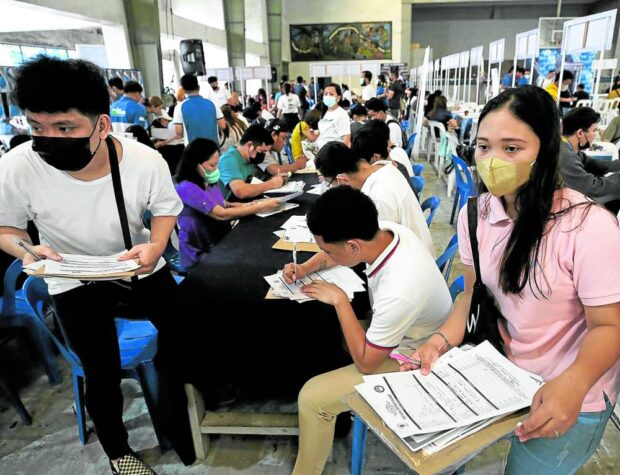
FLAWS ARE SHOWING New graduates are finding it hard to land jobs because online learning failed to develop the “soft skills fully” they would also need in the workplace, according to a Commission on Human Rights study. —RICHARD A. REYES
MANILA, Philippines —Urgent action is needed to address the problem of fresh graduates lacking “soft skills” and practical expertise, as highlighted in a Commission on Human Rights report on challenges graduates faced during the pandemic, senators said on Wednesday.
READ: Job hunt tough for graduates of ‘pandemic generation’
Sen. Risa Hontiveros said it’s not a new problem for education, with solutions already studied and implemented.
“The question is, to what extent do the education authorities execute these recommendations?” she asked in a statement.
The legislator hoped that the second Education Commission (Edcom) would chart “a game-changing strategy” that would address the issues hounding the sector and that the leaders of education agencies are “committed and competent to execute it in partnership with the different stakeholders, especially the teachers and the students.”
“Time is of the essence in implementing education reforms. The last thing we need is an employment crisis on top of an education crisis, especially because our graduates are being thrust into a post-pandemic world of historical inflation with which many families are struggling. The government must support them in their hunt for sufficient livelihood,” Hontiveros said.
Sen. Juan Edgardo Angara reiterated that the lack of soft skills among fresh graduates had been a problem even before the pandemic.
“It’s one of the concerns our educational system needs to address going forward, alongside poor reading comprehension, among others. Parents must also do their part as much as possible, though this is difficult with Overseas Filipino Worker parents and other realities on the ground,” he said in a separate statement.
But these, Angara noted, are already part of the discussions of the Edcom.
Sen. Jinggoy Estrada echoed the sentiment that youth employment has always been a perennial concern of the government.
“There are no silver bullets in ensuring our youth today develop learning and life skills. Theis problem entails a joint approach from all sectors. At the national policy level, I intend to institute reforms in the national apprenticeship program to address the needs of the youth sector,” he said in a statement.
But Estrada also urged the Department of Trade and Industry and the Technical Education and Skills Development Authority, among other concerned agencies, to ramp up and roll out training initiatives on “reskilling and upskilling” the workforce, particularly those who would soon seek employment.
“Hindi madaling mapunan ang mga kakulangan na dapat sana’y natutuhan ng ating mga kabataan sa mga face-to-face classes. Kailangan pagtulungan ng gobyerno at ng private sector ang mga hamon na ito. We need to institute reforms not only in the educational system that came up amid the pandemic but also in human resource development strategy,” he added.
(It’s not easy to fill the gaps that should have been learned by the youth in face-to-face classes. The government needs to work with the private sector to face this challenge. We need to institute reforms not only in the educational system that came up amid the pandemic but also in human resource development strategy.)
‘Honest-to-goodness’ review of K to 12
In a separate statement, Sen. Grace Poe likewise called on the government and the private sector to exert “serious effort” to address new graduates’ lack of soft skills and technical expertise, consequently preventing them from securing quality jobs.
She then pressed for an “honest-to-goodness review” on implementing the K to 12 programs to identify points for improvement “to make it more responsive and relevant to the needs of our students.”
“We hope concerned government agencies in charge of the review will make this a priority, which can also be useful to the joint congressional oversight committee on the K to 12 programs in its own assessment. We owe it to our learners to deliver on the promise of quality education and sustainable jobs,” Poe said.
READ: DepEd to revise ‘congested’ K-12 curriculum
The CHR report also covered the K to 12 program implementation.
The human rights body pointed out that the program provides senior high school students the much-needed competencies, but “not much attention is given to developing their life and soft skills, which, as the employer participants attest, are equally important in the workplace.”
Breaking unemployment cycle
Senate Majority Leader Joel Villanueva also said more has yet to be done by all agencies if they aim to break the country’s unemployment cycle.
According to Villanueva, the influx of entrants in the country’s labor force is already predictable as it happens every year. Even occasional or seasonal job openings can be anticipated, he added.
“We have to assist agri-fishing, manufacturing, and other sectors to create new and sustainable jobs, address issues on work-to-work transition, and ensure industry-relevant skills and core skills such as critical thinking, creativity, communication, and collaboration,” Villanueva said in a statement.
The lawmaker underscored the need “to be proactive in finding solutions, especially when it comes to easing unemployment in the country.”
Preliminary data from the Philippine Statistics Authority found that about 2.47 million Filipinos were available for work but had no jobs or businesses in February.
This posted a decline of 651,000 compared with February 2022, but an increase of 102,000 from January 2023.
RELATED STORIES:
Unpaid family work tears into employment numbers, bares full jobs picture
Unicef: Many children drop out as in-person classes reopen